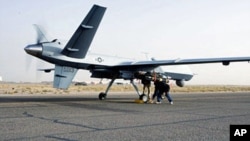A new report says the rapid escalation of drone attacks in Pakistan has been effective in targeting al-Qaida and Taliban militants. But analysts say the drone strikes are not likely to stop the insurgents from training bomb makers or planning assaults against Western targets.
According to an analysis prepared by the Counterterrorism Strategy Initiative at the Washington-based New America Foundation, unmanned airborne vehicle attacks have increased dramatically since U.S. President Barack Obama was sworn into office early last year.
In 2009, the report says, there were 51 drone attacks in Pakistan's tribal areas along the border with Afghanistan, compared with 45 during the entire eight-year administration of George W. Bush.
The study analyzed 114 reported strikes from unmanned aircraft during a six-year period. It says press accounts say the assaults killed up to 1,210 individuals, of whom as many as 850 were described as militants. The analysis says about a third of those killed were civilians.
The CIA's drone program has focused on Pakistan's lawless tribal areas, where officials say Taliban and al-Qaida affiliated fighters plan attacks on U.S. forces in Afghanistan and other Western targets.
The drone attacks are unpopular with many Pakistanis, who see them as a violation of their country's sovereignty. The United States does not officially acknowledge the attacks.
Paul Cruickshank is a New York-based investigative reporter specializing in al-Qaida and an alumni fellow at the New York University Center on Law and Security.
Cruickshank says eyewitness accounts by militants from the United States and Europe recruited by al-Qaida and captured by Western security forces show the drone campaign is having a major impact.
"The Western recruits who where there at the time describe this drone campaign as very effective. It was creating a lot of concern to al-Qaida," he said. "They were moving around Western recruits from place to place trying to prevent them from being targeted by these strikes. Al-Qaida really had to wholesale adapt its operation and organizational structures in the tribal areas of Pakistan," he added.
Cruickshank say al-Qaida is adapting to the drone campaign by decentralizing operations and training militants indoors. He says the terrorist group is relying almost exclusively on couriers to transmit information and has stopped using electronic communications that can be traced by intelligence agencies.
He says despite the drone campaign, and a major Pakistani Army operation against militants in the South Waziristan region, al-Qaida continues to offer what he says is sophisticated training to bomb makers focused on attacking Western targets.
"There has been an expansion in the drone campaign, there has been a new offensive in South Waziristan, but I do not think this has really wiped out al-Qaida. I think it is pretty likely you will see new plots emerging from the tribal areas of Pakistan," said Cruickshank.
Just last month a 25-year-old Afghan immigrant pleaded guilty in federal court in New York in connection with a plot to launch a suicide attack on the city's subway system.
Najibullah Zazi says he was recruited by al-Qaida while on a trip to Pakistan and was trained as a bomb maker in Waziristan.
Zazi says his "martyrdom operation" was to take place around September 11 last year, the 8th anniversary of al-Qaida's terrorist attacks on the United States and was intended to protest U.S. military actions in Afghanistan.
Former CIA al-Qaida analyst Barbara Sude, who is now with the Rand Corporation, says al-Qaida's leaders believe they can survive the drones and U.S. pledges to assist Afghanistan and Pakistan.
"They believe they can outlast any U.S. commitment to those countries. How long will the U.S. be willing to sacrifice and they believe it is a short time," said Sude. "Now they have been wrong. They were wrong in Iraq, they may be wrong in Afghanistan, but they know there are pressures on the U.S. and Western interests to just call a halt to it and leave," she said.
Last October the Pakistani military launched the mission in South Waziristan as Pakistani Taliban militants mounted a fierce campaign of attacks against government and civilian targets throughout the country.
In 2009 authorities say there were a record 87 suicide attacks in Pakistan, which killed about 1,300 people.
Peter Bergen co-directs the Counterterrorism Strategy Initiative at the New America Foundation.
Bergen says recent surveys show public support in Pakistan for al-Qaida and the Taliban has plummeted because of the violence.
"The Pakistani Taliban have made a major strategic error, which is attacking where they live, just as al-Qaida in Saudi Arabia made a major strategic error," he said. "So I think going forward, since al-Qaida and the Taliban are headquartered in Pakistan, this is the biggest change we have seen since 9/11," said Bergen
After about 18 months of sustained drone attacks, the report by the New America Foundation says many of Pakistan's militants have likely moved out of their once safe haven along the Afghan border into what they perceive are less dangerous parts of the country.
Pakistan has recently arrested top Taliban militants in the southern port city of Karachi, far from their past hideouts near Afghanistan.




